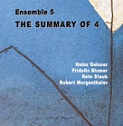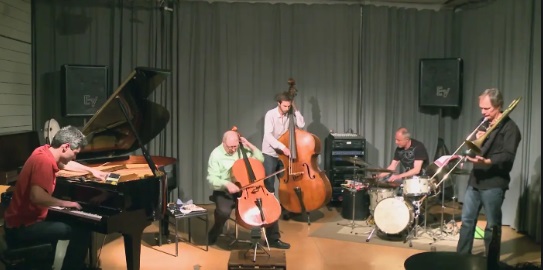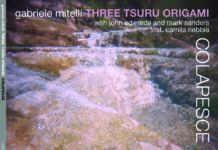 Without being considered a mad visionary, I could show you how the music of Ensemble 5 has a subliminal discursive character: you have to think of the musical instruments as creative objects observed as extensions of those who play them: through this transposition from man to the instrument (which in art is not at all difficult to accomplish) is attributed to each of them its own character through the way of improvising: in my imagination they (the four musicians of 5) meet in a cozy room and they are looking for a confrontation in their discussions: you will find that Morgenthaler is a non-stop gossip, Staub is a categorical professor of the dialogue that wants to fix his cathedral point of view, Blumer is the one who supports the thesis, I would say a mature man, while Geisser is the group’s moderator and the dynamic thrust of the discussion.
Without being considered a mad visionary, I could show you how the music of Ensemble 5 has a subliminal discursive character: you have to think of the musical instruments as creative objects observed as extensions of those who play them: through this transposition from man to the instrument (which in art is not at all difficult to accomplish) is attributed to each of them its own character through the way of improvising: in my imagination they (the four musicians of 5) meet in a cozy room and they are looking for a confrontation in their discussions: you will find that Morgenthaler is a non-stop gossip, Staub is a categorical professor of the dialogue that wants to fix his cathedral point of view, Blumer is the one who supports the thesis, I would say a mature man, while Geisser is the group’s moderator and the dynamic thrust of the discussion.In “The summary of 4” there’s a wonderful reality of free jazz, the kind that we have come to know in the history of improvisation: the title track, a perfect example of the Geisser’s accretion theory (the “Distributed Identity”) guide us to the historic dynamics of the American free jazz’s musical groups, an improvvisation that achieves the same results of those of Carla Bley/Charlie Haden’s collectives (although without the same physical amount of elements and musical structure); but be careful to songs like “Echoes“, which seem to foreshadow a new horizon, that of a true simulation of human feelings.
___________________________________
Reduci dall’esperienza concertistica effettuata in Giappone, il gruppo Ensemble 5 guidato dal percussionista svizzero Heinz Gesser, ritorna alla prova discografica con “The summary of 4“. Nella recensione del loro primo cd “Solstice” scrivevo: “….“Solstice” si muove tra ombre “musicali” che si allungano con brani senza struttura, in cui ognuno porta la sua sensibilità musicale. Se ne deduce un’esperienza di gruppo che è qualcosa di molto vicino al dialogo sincero tra gli umani….”.
Senza essere preso per un pazzo visionario, potrei dimostrarvi come la loro musica abbia effettivamente quel carattere discorsivo richiamato: pensate ad ogni strumento e ad una possibile creazione vista come estensione di colui che lo suona: tramite questa trasposizione da uomo a strumento (che nell’arte non è affatto difficile da compiere), si attribuisce ad ognuno un proprio carattere tramite il modo di improvvisare: nel mio immaginario essi (i quattro musicisti dell’Ensemble 5) si incontrano in una stanza accogliente e cercano un confronto nelle loro discussioni: troverete che Morgenthaler è un pettegolo senza sosta, Staub è categorico nel cercare di introdursi nel dialogo e fissare il suo cattedrale punto di vista, Blumer è colui che sostiene le tesi, un uomo ben attempato, mentre Geisser è il moderatore del gruppo e la spinta dinamica della discussione.
Nelle note interne di “The summary of 4“, Glenn Astarita, attraverso le parole di Geisser, spiega il perchè venga usato il numero cinque quando gli elementi effettivi sono quattro: sebbene il quinto elemento sia utilizzato in modo variabile nei concerti (in “Solstice” figurava il sassofonista Daoud), Geisser fa riferimento all’esistenza di un identità aggiuntiva distribuita, quella che fuoriesce dal fervore dell’improvvisazione, una sorta di ballerino sulla fune.
In “The summary of 4” c’è uno splendido free jazz, di quelli che abbiamo imparato a conoscere dalla miglior storia dell’improvvisazione: basterebbe da sola la title track, con il suo incedere dinamicamente rivolto all’esperienza dei gruppi free jazz americani dei sessanta/settanta (non sfigurerebbe affatto accanto alle improvvisazioni dei gruppi di Carla Bley o Charlie Haden, pur non avendo assolutamente la stessa quantità e struttura); ma attenti a brani come “Echoes“, che sembrano prefigurare un nuovo orizzonte, quello di una vera e propria simulazione delle sensazioni umane.







